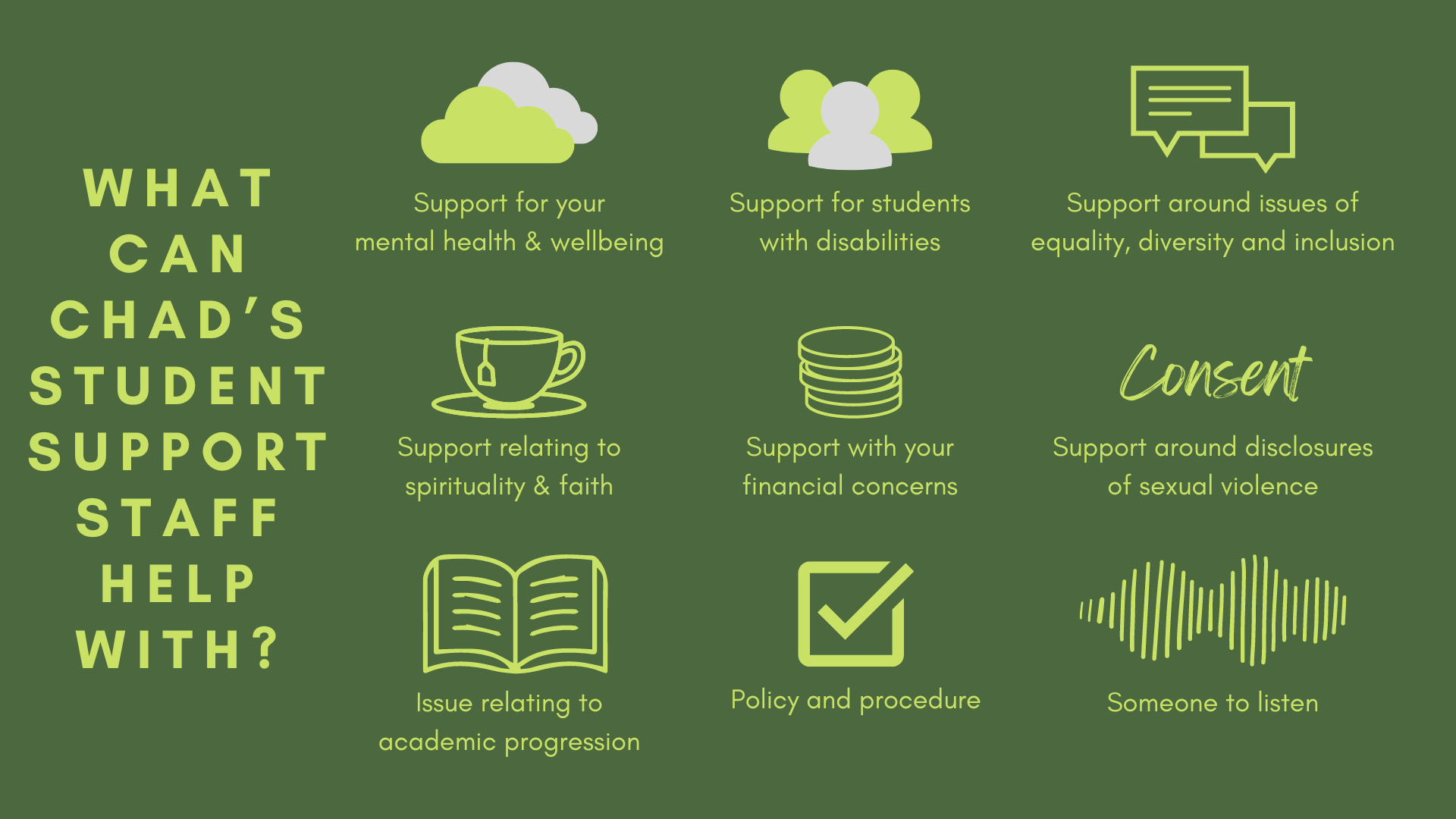The wellbeing of our students is a top priority for all staff at St Chad’s College. This page provides an overview of current student concerns, where to sign-post students for support and the expectations of you as a member of staff at St Chad’s.
This page is a longer read than some of the other staff training modules but is incredibly important and is intended to safeguard the wellbeing of you, the staff team, as well as our students – please stick with it until the end!
What do students say?
Student Minds is the UK’s student mental health charity. Research conducted by Student Minds in 2023 in conjunction with the Office for Students (the University’s regulator), found that mental health and wellbeing in addition to the cost of living crisis were key areas of concern for students. In addition, the following headlines were also published –
- 1 in 3 students have poor mental wellbeing, according to the Warwick-Edinburgh Mental Wellbeing Scale (WEMWBS).
- One quarter of students surveyed said they have a current, diagnosed mental health issue.
- 30% of students surveyed said their mental health had got worse since beginning university.
- 59% of students surveyed said that managing money was a cause of stress ‘often’ or ‘all of the time’ – an increase of thirteen percentage points compared to 2020/21.
- 1 in 4 students surveyed would not know where to go to get mental health support at university if they needed it.
In St Chad’s students regularly meet with members of staff to discuss a wide range of issues. The below provides an indicative but not exhaustive list of the issues that student support staff regularly see students about.

Who can help in St Chad’s?
While all staff at St Chad’s are keen to ensure that are students are content and well provided for, it is important to note that we have a dedicated staff team in relation to student support. All staff at therefore strongly encouraged to sign-post students to the appropriate specialist staff via their agreed reporting channels. For some of you this will be via your line manager but if you consider the circumstances to be of an emergency or urgent nature and your usual reporting routes are not possible, please don’t delay in approaching a College Officer or member of the Student Support Team directly.
The Student Support Team at St Chad’s is as follows –
- Victoria Brown – Vice-Principal and student support lead
- Jeanna Spencer – Assistant Principal focussing primarily on student support
- Charlie Pemberton – Assistant Principal with responsibilities around student experience and support
- Kate Eaton-Wells – College Chaplain
The offices for all members of the student support team are on the first floor of Main College and their contact details can be found HERE. Susan Mather also supports the team and may also be a helpful point of contact for you.
Outside of normal working hours, the College Duty Officer is also available to provide support to any member of staff who is working at other times and is concerned about an issue relating to student wellbeing. The Duty Officer role is fulfilled by Margaret, Victoria, Alistair or David and as Senior Officers of the College are tasked with decision making authority in urgent or emergency situations. The contact details for the Duty Officer are held in the College Reception. A College Porter can also provide guidance on the process of contacting the Duty Officer.
What do we tell our students?
Throughout the year, students can contact student support staff by emailing chads.support@durham.ac.uk. They can also book appointments online HERE.
Out College webpages also have a dedicated space called ‘Where to find help’ which is available HERE. This provides students with information about what to do during office hours, outside of office hours and in emergency or non-emergency situations. A graphical copy of this information is also shown below and is available on the wall of every student bedroom in College. This poster also includes a QR code which is scannable on a phone and links to the appointment booking page and more.
Please ensure you are familiar with this information below –
When someone asks your for help…
Being a member of a College community in Durham is very different to the experience of students who live more anonymously in University halls of residence across the UK’s major cities. We hope that our community-centre approach, size and the great people we have here all mean that students feel comfortable and confident to approach staff to ask for help. Of course, with this comes challenges and one of those is that students may ask you for help even if you do not have specific responsibility for student support.
We hope that this means that many more problems arise at an early stage, can be dealt with before they escalate and that our students enjoy more fulfilling and enjoyable experience in the long-term. However, it is important that all staff are aware of how best to respond to students who ask them for support, are aware of the boundaries of their role and how best to sign-post students for next steps.
Firstly, just listen…

It sounds simple but, listening can be hard, not only because of the nature of what is being shared but also because of the need to be active and present with the person you are with. We often call this active listening and it involves fully engaging with a persons verbal and non-verbal messages. Key aspects of this including paying attention and showing empathy. Crucially listening in this way doesn’t necessarily involve saying ‘yes, I agree’ (this can sometimes be unhelpful for the student or the College), but rather something along the lines of ‘I hear your concerns’ or ‘I can see that this is difficult for you’.
What to do next…
You have heard their concerns so your next step is to work out what they, or you, need to do next.
Firstly, is the situation you find yourself in an urgent or emergency situation? For example, is there a risk of someone being harmed? If yes, make contact with the College Reception, take them to a member of student support staff or College Officer, or call the emergency services as needed.
Alternatively, if the situation needs action within a reasonable period of time, consider how you can pass it on and who you can pass it to. Some option in this situation could include –
- Suggesting they book an appointment with a member of the Student Support Team.
- Suggesting they take a look at the ‘Where to find help’ poster in their College bedroom.
- Asking if they have a friend or family member they can talk to, examples might include their roommate.
You should then speak with a College Officer or member of the student support team who will be able to make a record of your interaction and takeover responsibility for the case. Where possible, staff will try to provide you with some headlines from the next steps.
Being clear about confidentiality
Finding kind and supportive ways to conclude a difficult conversation are also important. Crucially it is important that you are clear, from the start of your conversation, that you cannot promise confidentiality. In other words, you cannot promise to keep whatever you are told to yourself. This approach ensures that students get the best possible support while also looking after the wellbeing of you as a member of staff.
Confidentiality is sometimes misunderstood – none of us can promise confidentiality. Those of us with specific responsibilities around student support also cannot promise to keep something entirely to ourselves.
Indeed, it is particularly important that we don’t promise confidentiality and do go ahead and share information in cases where someone might be at risk of harm.
In circumstances where you think a student is likely to tell you something of a sensitive nature which will need intervention from others, phrases such as the following, can be helpful –
‘I think you may be about to share something difficult with me – that’s ok, but if you do I might need to share it with X, are you ok with that?’
In response to requests to keep something confidential you might consider responding with –
‘I’m sorry, but I can’t promise to keep this to myself. I’m worried about you and have a responsibility to share this with others who can support you’.
You might then offer some reassurance about who you are going to tell as follows –
‘I feel sure that X will be really well placed to support you with this. They will be sensitive with the information you share and will offer a great non-judgemental listening ear. Does that offer you some reassurance?’
The above phrase set clear boundaries while also being kind and empathetic. Of course, you are not expected to memorise these phrases exactly – you will convey them in your own style and that is fine!
Why do I need to pass it on?
Someone having chosen to share their concerns with you is good – they clearly trust you and it suggests that you have a positive professional relationship with them. But, being the person they choose to talk to at that moment doesn’t make you the right person for them to speak to beyond your initial conversation.
This is for a whole range of reasons –
- Your role may not require you to take on this responsibility;
- You won’t necessarily have the appropriate training to deal with the matter long-term;
- The student support team or College Officers may have a wider picture of information about the case which is important in supporting the student but isn’t available to you;
- You may, for personal reasons, feel that you can’t offer them ongoing support and that is absolutely ok!
Where should I sign-post them?
It is rare that staff beyond the student support team will actively refer students to external services or the NHS without a member of the student support team being aware of working with you to arrange this. However, you may find it helpful to be aware that services across the wider University include the Counselling and Mental Health Service, the Student Financial Support Office, the Student Conduct Office and many more.
You do not need to remember or know when and where to sign-post students. Rather, your primary aim is to encourage and help a student to be linked with the student support team at St Chad’s.
Don’t worry!
Difficult conversations rarely go as planned and perfectly worded discussions are unlikely to be achieved. Don’t worry! We simply ask that you do what you can and pass on information. Not handling something perfectly but passing it on is still a great outcome and College Officers will support you. Keeping something to yourself could be far more problematic for all!
Did you know…
- Chad’s has a College Student Support Fund available to help students who are in financial need. This is often important in cases of urgent need where students need funds quickly to buy food or pay for travel. Students should contact the Student Support Team to access this.
